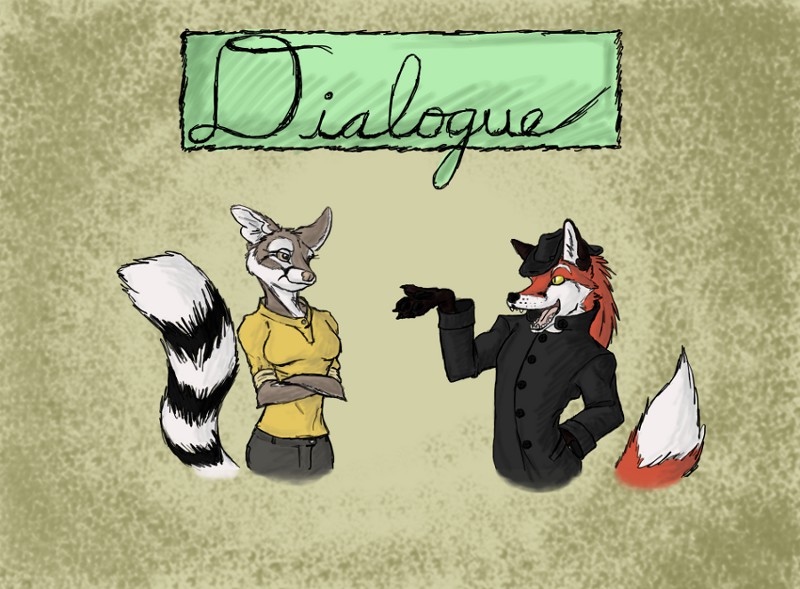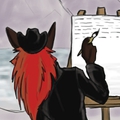Sign In
CloseFrank's Writing Tips and Bachelor Cookbook: Dialogue by MLR
As requested, here are my thoughts on writing dialogue. This one's a bit longer because I had more to say about it. Turns out it's a pretty complicated subject, and I doubt I did it full justice here, but hopefully it'll get folks started. Which is really all I'm trying to do with this series anyway.
I'll be leaving for a period of two weeks come the 20th, so you probably won't be seeing another one of these until after that (May 4th is when I return). Regardless, let me know what other subjects you want me to cover. Assuming people are still reading these, of course, considering how frequently I update.
Submission Information
- Views:
- 1774
- Comments:
- 17
- Favorites:
- 10
- Rating:
- General
- Category:
- Literary / Other
Comments
-
-
-

I think you made an unfortunate reference to Chester. As cacomistles are chagrined from being asked if they're related to 'Chester'; an infamous cacomistle male actor who starred in X-rated Terri Smith films many many years back.
-

Ha ha... maybe that's it. (Although to be honest, I had to go look up Chester the cacomistle just now to figure out what the hell you were talking about.)
On a related note, are ringtail cats and cacomistles the same thing?
-
-
-
-

I have no doubt I'll be referencing these at least a few times. For next time, how about properly painting the environment around a story? It's one thing to get the characters right, but if the world around them is dull and boring...
-

As in... what, worldbuilding, description, something else? Because I'm notoriously lazy about the former, to be honest.
-
-

Hmmm... okay. I can do description. I can also do worldbuilding in terms of what you can do in the course of a story. The kind of large-scale, time-consuming, external worldbuilding that lots of people do as a hobby, though, isn't something I'm qualified to talk about because I pretty much never do it (except for the occasional map so I know where things are in relation to other things at a glance).
-
-
-
-

Oh man, this was incredibly informative! I love writing dialog in my stories, but I've always had issues with using tags. I've had so many in the past tell me that using he said or she said was bad, that you had to be more descriptive. In some small way, I've never really agreed, but trudged along adding descriptive tags anyway. Now it completely frustrates me when I write dialog, trying to figure out what "tag" to use. I've been trying to move away from it, but changing a bad habit is hard, especially when it has been drilled into you for so long by those who were supposed to know what they were talking about...
But anyway-Thank you so much for this-I now really want to go through and edit all my stories...but I think I will have to just start trying to implement these ideas from hear on out and catch the old stuff on future revisions...I look forward to the next installment of this series!
-

I'm sure there's an argument to be had for using words other than 'said' as dialogue tags, but I personally have never heard a particularly convincing one. This is really a dichotomy, though, in my experience: you have the camp I'm in where tags are almost completely ignored, and then you have the opposite camp where people insist on variety. I just happen to think that the dialogue itself is the important thing, and so you never want to detract from that by forcing the reader to focus on the tag. Unless you're writing plays or movie scripts or something, of course.
Anyway, thanks for your feedback. Glad you enjoyed it.
-

I'm sort of in-between. I see the need sometimes of descriptive tags and the use of the generic ones, and none at all. But I have been very guilty of using those ones you pointed out like 'purred', 'growled', etc, and have been very bad with tacking on those 'ly' adverbs when I should have been writing the emotions in other ways. It has been a frustrating journey in trying to retrain my thought process on this matter, but seeing well written examples such as yours gives me hope that it is possible.
-
-
-

How very insightful this read was.
What these tips you wrote has drawn my attention towards to mostly, is how different languages express dialogue in different manners on paper.Anyway, this was very informative, and I appreciate that you take your time to share your thoughts and knowledge on writing. You never know enough about English literature. Let's hope you'll never get to use that teleport on me from now on, haha. I'm yet to test the stiffness of my cheeks.
-

Well, thanks for your comment. I will say, something I wasn't thinking about while writing this was how such things are done in other languages than English. I'm familiar with French conventions, which seem similar to English aside from punctuation (they typically use an em-dash), but nothing else. What were your thoughts on other languages, then (I see you're Romanian, which I seem to recall is a Latin-based language)?
-

My thoughts are mainly in regards to aesthetic and personal feelings I have when I regard the two.
Romanian dialogue feels a little detached from the rest of the paragraphs as it is boldly emphasized each time with a new paragraph and a long dash mark at the beginning of it, marking a reply. There is a lack of quotation marks, in fact, the only time when quotation marks are used is when references are quoted or when things I purposely pronounced wrong, and even then, we employ them as such ,, '' not " "
There is also no actual form of separation from the dialogue itself, and the narrator's instructions as you would have with quotation marks. The only way to distinguish the two is that in a dialogue, the character's reply start with an uppercase while the narrator's instructions start with a lowercase. Sometimes they are found both in the same sentence (and are not separated not even by a comma, exclamation or question mark) and they are separated with a ,
(I think the same manner is used in German?)I personally feel that English literature is more... formal in its dialogue. Maybe it is the fact that I am not yet familiarized with its regionalisms and slang language entirely. Or maybe it is simply because it has a more narrowed down, to the point, structure, as a language itself. It may also be a cause of the way both languages' literature have evolved. The rural environment had been a prominent subject of interest in previous literary currents here.
There are also less interjections in the English language. At least, so I believe considering the ones I have stumbled upon.And all in all, I guess it is the way both of them are constructed. I mean, I can tell you (most of the times... well, sometimes. I am always mindful of the might of exceptions) what language a dialogue is/was or what country of origin the author has just by reading it, regardless of the language it was translated because there are certain elements which betray it, as different languages, and different people from their respective countries have different things they relate to. Thus, you see different motifs, different writing styles, stylistics, metaphors, informal proverbs, and all in all, different manners in which something, dialogue or description is elaborated.
And yes, Romanian is a latin-based language.
All in all, I have to say, it is always entertaining to understand the differences between different languages and their literature. What fascinates me most is the universal trait of English literature (And previously French, and maybe German too?) and how it indirectly sets a standard for all others to follow.
This universal quality in English literature is also what attracted me to it and tempted me to engage in it rather than Romanian literature.-

Different time periods have different standards too, of course. But regarding English and formalism, it may just be because English has become such a precise language, where you can find a single word for pretty much any concept you like (the print edition of any edition of Oxford's dictionary can run well over 5000 pages). So maybe it's that intent on being exact that drives some of the grammatical standards.
But at the same time, there's always been a battle between 'purists' (which with regard to English is basically a nonsense word, as English hasn't been 'pure' since probably the time Beowulf was written) and laymen who want to make it easier. You've got movements in the US of people trying to simplify spelling, cursive writing is being phased out in schools, and new words are just added willy-nillly to the dictionary whenever they happen to catch on with the public. So maybe that's part of the reason it catches on so well... it's just very adaptable.
I will admit, I am wholly unfamiliar with Romanian literature. The only even remotely Romanian thing most Americans are exposed to at any point in their lives would be Bram Stoker's Dracula (which of course takes place mostly in England anyway), or all the clichés that spawned from that. And I guess briefly there was that song "Dragosteia din tei" by O-zone back in the early internet days. I feel like a lot of the world's literature is left behind due to rarely or never getting good translations into other languages, which is really a shame.
-
-
-





Link
duroc
That gal in the picture is totally not into you.